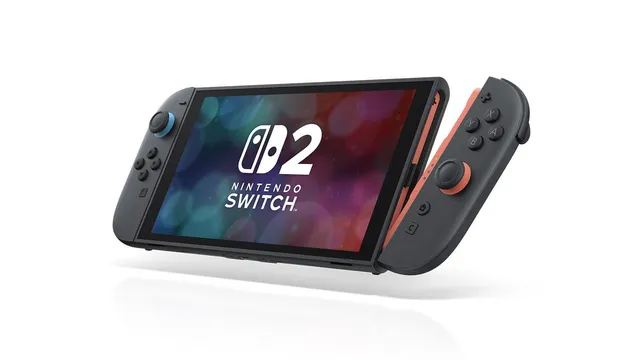
Nintendo reveals long-awaited Switch 2 in major gaming announcement
2025-04-05 00:00- Nintendo is unveiling the Switch 2 gaming console during the Nintendo Direct presentation today in a live-streamed event.
- The reveal follows years of anticipation and leaks concerning the new console's features and capabilities.
- The presentation aims to excite fans and may set a new benchmark in gaming technology and marketing strategy.
Express your sentiment!
Insights
Today, April 2, 2025, Nintendo is hosting a significant event known as the Nintendo Direct to unveil new details about the Switch 2 gaming console. This presentation will last approximately one hour and will be accessible through live streaming on their official YouTube channel, allowing fans worldwide to observe the details in real-time. Following an extensive build-up filled with speculation and anticipation over the past few years, this event marks Nintendo's first major console launch since they introduced the original Switch in 2017, highlighting their commitment to evolving in the competitive gaming market. The upcoming console is expected to include various innovative features, particularly enhancements regarding gameplay and control methods. Previous leaks have suggested that the new Joy-Con controllers might offer mouse-like functionality, a significant shift for Nintendo's control systems that could introduce new gaming dynamics. While analysts anticipate this reveal to include information about titles like a new Mario Kart and other flagship Nintendo franchises, the concrete specifics regarding the console’s price and release date are still under wraps. Furthermore, the excitement has been palpable among the gaming community as discussions have circulated about potential capabilities, such as 4K gaming support. Although initial rumors hinted at high-end technology, reports have emerged indicating that not all development kits feature a 4K output, leading to ongoing debates among developers and industry insiders. This uncertainty adds an element of intrigue as fans speculate about what to expect from this next-generation console. As anticipation builds, gamers are also eager to learn how the new console will handle backward compatibility with existing Nintendo Switch games. Nintendo has assured fans that the Switch 2 will be capable of playing physical and digital copies of the original Switch games, although there might be caveats regarding compatibility or performance. Additionally, plans for promotional events, called 'Switch 2 Experience', across global cities indicate Nintendo's strategic approach to marketing, aiming to engage with their customer base on a personal level as they roll out this major product. Overall, today's Direct is not just a significant moment for Nintendo but also a pivotal event in the gaming industry that may reshape consumer expectations and influence market trends in the years to come.
Contexts
Nintendo, a pioneer in the video game industry, has a storied history of console launches that have not only shaped the company but also impacted the gaming landscape globally. Founded in 1889, Nintendo initially started as a playing card company, but it would not be until the release of the Nintendo Entertainment System (NES) in 1983 that it truly entered the video game console market. The NES played a crucial role in reviving the video game industry after the crash of 1983, establishing Nintendo as a household name and introducing iconic franchises like Mario and The Legend of Zelda. The home console was a monumental success, selling over 61 million units worldwide, and it set the stage for Nintendo's future endeavors in the gaming industry. Following the success of the NES, Nintendo launched the Super Nintendo Entertainment System (SNES) in 1990, which improved upon its predecessor with advanced graphics and sound capabilities. This console solidified Nintendo's reputation for high-quality first-party games and further expanded its library of beloved franchises. The SNES sold over 49 million units and is often hailed as one of the greatest gaming consoles of all time. The next significant step came with the Nintendo 64, released in 1996. It was the first home console to feature 3D graphics and utilized cartridges instead of CDs, which limited storage but provided faster load times. Despite mixed initial reviews and a slower sales performance, the N64 has become a beloved console, known for titles like Super Mario 64 and The Legend of Zelda: Ocarina of Time. The early 2000s saw the launch of the Nintendo GameCube, which supported miniDVDs and introduced online gaming capabilities. While it did not achieve the commercial success of its predecessors, the GameCube is remembered fondly for its innovative controller design and game library, which included classics like Super Smash Bros. Melee and Metroid Prime. In 2006, Nintendo pivoted to motion control technology with the Wii, which revolutionized the gaming experience and appealed to a wide demographic, making video games more accessible to casual gamers and families. The Wii sold over 101 million units, becoming one of the best-selling consoles of all time and emphasizing Nintendo's capacity to innovate and capture public interest. The arrival of the Wii U in 2012, however, marked a setback for Nintendo due to poor marketing and lack of third-party support, resulting in disappointing sales despite introducing features like the GamePad controller. The next console generation, however, saw Nintendo rebounding with the Nintendo Switch, released in 2017. The hybrid nature of the Switch, allowing for both handheld and docked play, was a game-changer. The Switch became immensely popular, selling over 100 million units within a few years and creating a strong library of games. Nintendo's unique approach to gaming and its ability to innovate, whether through hardware designs or software offerings, continues to influence the industry, cementing its legacy as a titan of gaming.